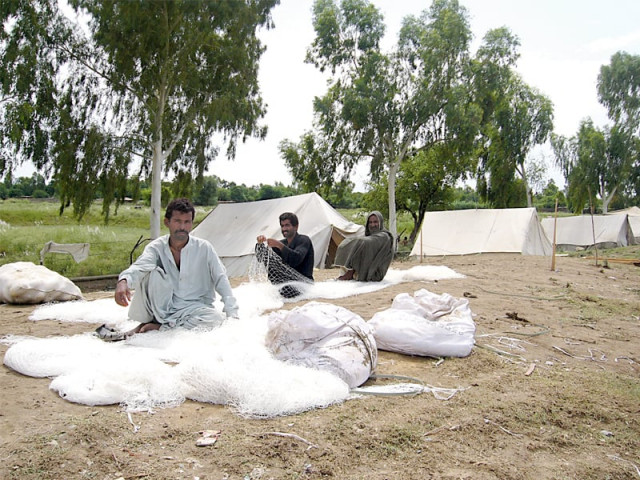Breaking bonds of slavery: For fishermen, it’s a vicious circle
Forced to work for years on creditors’ terms, they have not been able to retire their debts.

Unable to break the shackles of indebtedness, over 70 fishermen families have been forced to work as bonded labourer for years on their creditors’ terms. There seems to be no end of their plight.
Their masters change but the principal amount they had borrowed years back remains unpaid. Their contractor ‘bought’ them from their previous masters by paying hundreds of thousands in outstanding debt. International and domestic instruments against slavery have made no difference to their lives.
The fishermen owe Rs100,000 to Rs300,000 to the contractor who “purchased” them from the previous creditor. “I owed Rs200,000 to the creditor when my present contractor brought me to Haripur a few days back. He paid the debt I hadn’t been able to clear for the past three years,” said Rab Nawaz, a resident of Sehwan Sharif, Sindh, who lives in the tented village with his two wives and nine children.
Ali Sher another fisherman from Larkana, who owes Rs100,000 to the contractor, said his family migrated from Guddu Barrage in Sindh to Khanpur in Hazara about five years back. His elder brother Gulsher was indebted for Rs150,000 for the last three years, while their father who died last year in debt.
Gulsher said they mostly take advance for new boats, repairs and fishing nets, which are often lost in deep waters. “My contractor is supposed to bear medical expenses, three meals a day and equipment required for fishing.”
The contractor maintains all the accounts and deducts the debt against the payment due at the end of the year.
Ghulam Nabi from Rajanpur in Punjab, who owes Rs200,000 to the contractor, said fishermen are paid Rs1,500 for 40kg or Rs35 per a kg for the catch which the contractor sells for Rs170 to Rs200 per kg. Every fisherman casts over 100 nets in the lake and the quantity of the produce varies from 5kg to 80kg daily, he added. “Since our income fluctuates, we barely eke out a living and are unable to pay back our debt.”
From June to mid-September fishing is banned. They accumulate debt in the absence of an alternative source of income.
Nabi has been in the profession for four generations and has come to terms with his fate. “Nothing can change my life.” Former premier Benazir Bhutto had abolished fishing contracts in Sindh waters, during her second term, permitting fishermen to catch and sell the produce, but in Punjab and K-P, contracts are a source of exploitation.
Their children, too, are compelled to live in abject poverty deprived of basic rights and have no option but to help their parents offload the fish they catch from early morning till afternoon day in and day out. Samina, 10, one of a group of malnourished children, standing outside a tent, said, “Yes I have strong desire to attend school and change the fate of my parents, but there is no chance.”
Qamar Hayat a social activist, who works for protection of labour rights promised to fight a legal struggle for their rights. He criticised the district administration for its failure in checking bonded labour. Executive Director Rural Development Project Ahsan Khan said the fishermen were employed in violation of the constitution and International Covenant on Economic, Social and Cultural Rights.
District Labour Officer, Haripur, Abdullah Khan said a 13-member District Vigilance Committee, comprising a retired judge, lawyers, local government representatives, officials of labour and social welfare department, media and NGOs was constituted in 2005-6, under the Bonded Labour System Abolition Act, 1992, headed by former district nazim Yousaf Khan, but it has not even convened once.
When approached for the contractor’s version, a representative declining to be identified, said fishermen were engaged for Rs1,500 for a 40kg catch and not forced to work.
Published in The Express Tribune, January 17th, 2012.













COMMENTS
Comments are moderated and generally will be posted if they are on-topic and not abusive.
For more information, please see our Comments FAQ